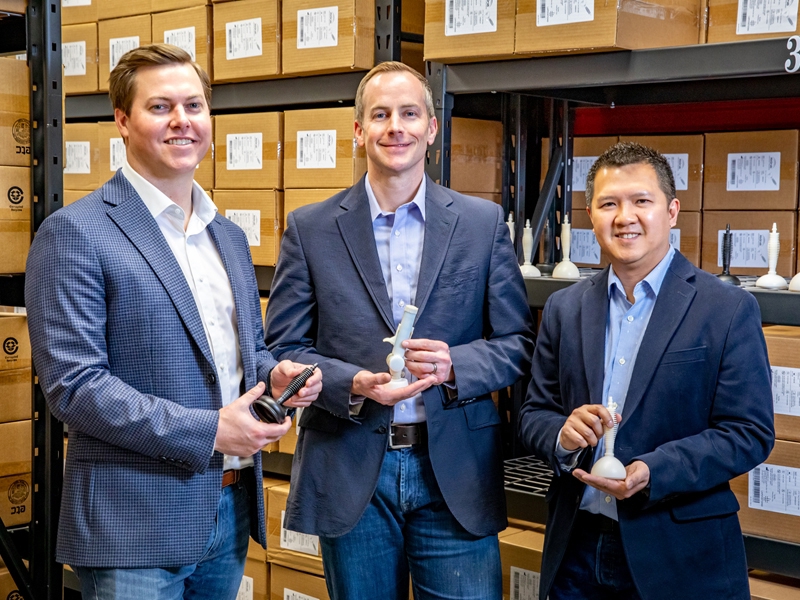
Lapovations, a medical device company that was launched from the graduate-level New Venture Development course at the U of A, has now attracted more than $3.5 million in dilutive and non-dilutive investment and has 50 independent sales representatives operating in 18 states.
The company’s signature product is the AbGrab, a non-invasive device that uses suction to lift the abdominal wall at the start of laparoscopic surgery. Before the advent of AbGrab, surgeons had to either manually lift the abdominal wall, which can be difficult to grasp on thin or obese patients, or use invasive towel clips, which can cause painful bruising.
AbGrab is now being injection molded in Louisiana, while clean-room assembly and packaging is completed in Texas. Over the next year, the company hopes to continue the buildout of its sales force, with a goal of 125 sales reps. They have also set a goal of having at least 100 laparoscopic surgeons actively using the device by 2024.
The AbGrab was born from the frustrations of Dr. Chris Taylor, an OBGYN who found the two existing options for abdominal lifting, as outlined above, unsatisfactory. He expressed those frustrations to Jared Greer, a longtime associate who was working for a medical device manufacturer at the time. Together, they dreamed up the AbGrab, eventually becoming co-founders of Lapovations.
The secret sauce was Greer’s participation in the graduate-level New Venture Development course co-taught by Carol Reeves and Sarah Goforth. At that time, 2016, Greer was earning a master’s degree in biomedical engineering. Over the next two years, Lapovations became the U of A’s most successful startup competition team, winning seven state, regional and national business plan competitions and earning over $305,000 in cash and investment prizes.
“What people should understand about Dr. Reeves’ class is that it is not just an academic exercise,” Greer said in 2018 after winning a competition. “For teams like ours who have a viable business idea or commercial technology, it’s more like an accelerator program. In addition to excellent classroom instruction, we received in-depth mentoring from a network of experts, access to angel and venture capital investors, seed funding for customer validation from the Delta I-Fund and around-the-clock coaching from our advisers during competition season. It was a lot of work, but also the best possible preparation for starting and growing a new business.”
While the AbGrab is elegantly designed, getting it right wasn’t so simple. Nhiem Cao, chief operating officer, recounted how the team used a device for fetal vacuum extraction as a launching point. Then they explored other materials. “It needed to be rigid enough to withstand a vacuum without collapsing,“ Cao explained, “but flexible enough so the handle can articulate.” Once they had the material, thermoplastic polyester elastomer, they began to examine the suction cup itself.
“It worked great for 85 percent of our target population,” Cao said, “but we wanted to improve on that.” After testing seven additional designs, which included finding the right balance between the area of suction and volume of the cup, they were able to increase the AbGrab’s success rate to nearly 99%.
Lapovations successfully completed human trials last October and announced the completion of a Series A funding round in January, raising $1.25 million – 25% more than they set out to raise.
Spencer Jones, who joined the company last October as chief technology officer and vice president of sales after two years of consulting for the company, looked ahead to the future of Lapovations. Jones, an alumnus of the Eleanor Mann School of Nursing, said the company is currently focused on establishing a foothold in the market with AbGrab, but he hopes to use its success to create a suite of laparoscopic products.
“Five years from now,” Jones said, “we hope to be deeper into that suite, with multiple products in the marketplace. We want to be dominating the market in abdominal lifting and have significant penetration in the broader laparoscopic surgery market.”
Initially headquartered at the U of A Startup Village, the company now resides at the Arkansas Research and Technology Park.
About the University of Arkansas: As Arkansas' flagship institution, the U of A provides an internationally competitive education in more than 200 academic programs. Founded in 1871, the U of A contributes more than $2.2 billion to Arkansas’ economy through the teaching of new knowledge and skills, entrepreneurship and job development, discovery through research and creative activity while also providing training for professional disciplines. The Carnegie Foundation classifies the U of A among the few U.S. colleges and universities with the highest level of research activity. U.S. News & World Report ranks the U of A among the top public universities in the nation. See how the U of A works to build a better world at Arkansas Research News.
Topics
- Engineering
- Health, Fitness & Wellness
- Research & Innovation
- Economic Development
- College of Engineering
- Graduate School & International Education
- Sam M. Walton College of Business
- Division of Economic Development
- Department of Biomedical Engineering
- Department of Strategy, Entrepreneurship & Venture Innovation
- Office of Entrepreneurship & Innovation
- Technology Ventures
Contacts
Spencer Jones, chief technology officer & VP of sales
Lapovations
501-428-7467,
Hardin Young, assistant director of research communications
University Relations
479-575-6850,